Related Research Articles

College Bowl is a radio, television, and student quiz show. College Bowl first aired on the NBC Radio Network in 1953 as College Quiz Bowl. It then moved to American television broadcast networks, airing from 1959 to 1963 on CBS and from 1963 to 1970 on NBC. In 1977, the president of College Bowl, Richard Reid, developed it into a non-televised national championship competition on campuses across America through an affiliation with the Association of College Unions International (ACUI), which lasted for 31 years. In 1989, College Bowl introduced a (sponsored) version of College Bowl for Historically Black Colleges (HBCUs) called Honda Campus All-Star Challenge (HCASC) which is ongoing. In 2007, College Bowl produced a new version and format of the game as an international championship in Africa, called Africa Challenge. The College Bowl Campus Program and National Championship ran until 2008.

Beat the Geeks is an American television game show that aired on Comedy Central from 2001 to 2002. The show was rerun on The Comedy Network in Canada.
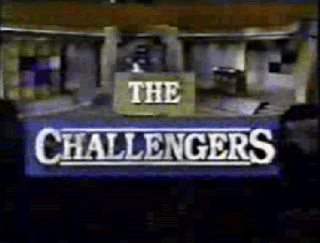
The Challengers is an American game show that aired in syndication from September 3, 1990, until August 30, 1991. The show remained in production for its entire run on the air, differing from most syndicated game shows which usually wrapped in the early summer.
Idiot Savants was an American television game show on the MTV network which ran from December 9, 1996, to April 25, 1997. It was created by Michael Dugan and Chris Kreski, directed by Steve Paley, and hosted by comedian Greg Fitzsimmons.

Think Fast is an American children's game show which aired on Nickelodeon from May 1, 1989, to March 30, 1990, with reruns airing weekly until June 29, 1991.
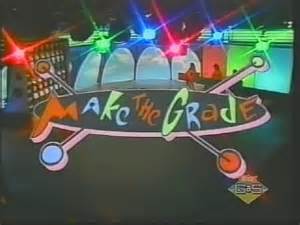
Make the Grade is a children's game show that aired from October 2, 1989, to September 14, 1990, on Nickelodeon.
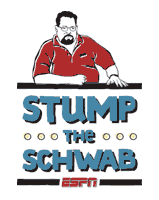
Stump the Schwab is an American game show that aired on ESPN2 and ESPN Classic from July 8, 2004 to September 29, 2006. The show featured three contestants trying to defeat Howie Schwab, ESPN's first statistician, in a sports trivia contest. Stuart Scott was the show's host. The show also appeared on Canada's The Score Television Network.
Time Machine is an American game show where contestants compete to answer trivia questions about popular culture and recent history to win prizes. The show aired on NBC from January 7 through April 26, 1985, and was hosted by John Davidson. Charlie Tuna was the announcer, with Rich Jeffries as his substitute. Reg Grundy Productions produced the series, and upon its premiere Time Machine was one of three Grundy series airing on NBC.

Debt is an American game show hosted by Wink Martindale which aired on Lifetime from June 3, 1996, to August 14, 1998. The show featured contestants who were trying to earn money to get out of debt.
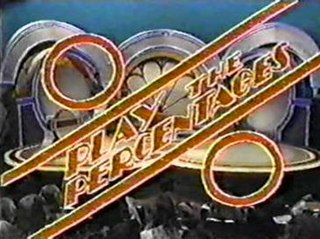
Play the Percentages is an American game show hosted by Geoff Edwards which aired in syndication from January 7 to September 12, 1980. Jay Stewart announced for the first six weeks, after which Bob Hilton became the permanent announcer.

History IQ is a game show on The History Channel which premiered on October 2, 2000 and aired for two seasons. Marc Summers hosted and Harvey announced, reuniting the two from the Nickelodeon game show Double Dare. History IQ was produced by Glow in the Dark Productions.
BrainTeaser was a British game show based on the original Dutch format of Puzzeltijd. The show was broadcast live, with phone-in viewer puzzles being announced and played during the show in addition to the studio game. During its run from 5 August 2002 to 7 March 2007, it aired on Five Mondays to Fridays, usually for an hour around lunchtime, and was fronted by various presenters rotating with one another. Beginning in August 2005, a version of the show that exclusively focused on viewer participation was broadcast in a four-hour long block on YooPlay TV every day after the Five broadcast, as part of a thirteen-week trial.

The Big Showdown is an American game show that aired on the ABC television network from December 23, 1974 to July 4, 1975. Jim Peck hosted the program and Dan Daniel served as announcer.
Mad Libs is an American children's game show based on the book/word game series. It aired on the Disney Channel from July 26, 1998 to mid-1999, and was hosted by David Sidoni. Dick Clark and J. D. Roth produced the show.
Trashed is a television game show that ran on MTV from February 14 to July 23, 1994, with Chris Hardwick as host.
Odd One Out is a British game show based on the American version entitled Knockout. It aired on BBC1 from 16 April 1982 to 19 April 1985 and was hosted by Paul Daniels. The show is based on a short-lived American game show produced by Ralph Edwards called Knockout, hosted by Arte Johnson.
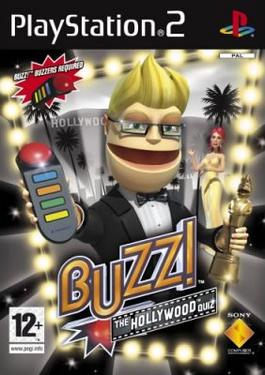
Buzz!: The Hollywood Quiz is the fifth installment in the Buzz! series of video games developed for the PlayStation 2 by Relentless Software. Players have to answer questions asked by the quiz master using the four Buzz! remote controls.

Richard Osman's House of Games is a British quiz show produced by Remarkable Television, a branch of Banijay for the BBC. The show is hosted by Richard Osman. It is played on a weekly basis, with four celebrities playing on five consecutive days to win daily prizes, and the weekly prize of being crowned as "House of Games" champion. Points are accrued depending on where each celebrity finishes on each day and the points are doubled on Friday's show. During filming for series 6, Richard celebrated his 500th episode.

Common Knowledge is an American television game show hosted by Joey Fatone that aired on Game Show Network from January 14, 2019 to August 13, 2021. On April 17, 2019, media reports stated that GSN had renewed the show for a 130-episode second season. On March 25, 2021, GSN renewed the show for a third season, which premiered on May 17, 2021.

Master Minds is an American game show airing on the Game Show Network. The show debuted on June 10, 2019, under the title Best Ever Trivia Show, hosted by Sherri Shepherd and regularly featuring Ken Jennings, Muffy Marracco, Jonathan Corbblah, Arianna Haut, and Ryan Chaffee. The series was renamed Master Minds on April 6, 2020, with Brooke Burns replacing Shepherd.
References
- ↑ O'Keeffe, Tim (September 16, 2004). "Alumnus -- a game inventor and author -- won't be denied". Colgate University . Retrieved August 28, 2010.
- ↑ "TriBond CD-ROM". patchproducts.com. Archived from the original on May 8, 1999. Retrieved July 23, 2023.
- ↑ TriBond Pilot. Game Show Network. February 13, 2002. Archived from the original on 2021-12-14. Retrieved November 22, 2018.
- ↑ https://archive.org/details/Games-Magazine-June-1993-images/page/n49/mode/2up